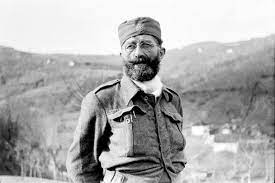Written By: Paul Jeremic

The rapid collapse of the Yugoslav Royal Army in the April War gave the impression of invincibility and absolute military supremacy of the Nazi military machinery. However, a group of Yugoslav officers managed to evade capture, and refused to acknowledge the capitulation of the army. This group, led by General Staff Colonel Dragoljub Mihailovic, arrived on Ravna Gora 11. Maja and guided by Njegoš's verses: "Al' tirjanstvo step by the neck, bring it to the knowledge of rights, that is the most sacred human duty”, founded an organization called “Yugoslav army in the Fatherland”. In this way, the anti-fascist character of the Royal Army and the Serbian people was best expressed, which received its first organized resistance movement in less than a month since the end of the war.
The centuries-old traditions of freedom-loving, invincibility, rebellion and justice-loving Serbian people, together with the expertise and determination of the officers gathered around Mihailovic, provided the prospect of continuing the fight against the invaders in the country. Soon, a connection was established with the Yugoslav government in emigration, which also did not recognize the capitulation, and the construction of an organizational network of the ravnaorska movement began. Due to the guerrilla way of organizing, and the creation of smaller operational units in its beginnings, Jvuo was reminiscent of Chetnik rebel units that fought in old Serbia in the early 20th century. Century.
The main War goal of the Yugoslav People's Liberation Army was the restoration of the parliamentary monarchy led by the Karadjordjevic dynasty, with respect for all democratic principles and rights of the three constituent South Slavic peoples(Serbs, Croats and Slovenes). Aware of the still poor equipment and the fact that it had only just come into contact with the allies, but also conditioned by the German policy of retaliation, which included initially 50 and then 100 killed civilians for one killed German soldier, the Chetnik supreme command initially devoted itself to obtaining military equipment and creating conditions for the protection of the people. Soon the Yugoslav army in the fatherland was recognized and recognized by the allies, and the exploits of these brave guerrillas were heard by the whole world. The names of Mihailovic and his fighters, who dared to rise up against the German military force at its peak, made the front pages of many world newspapers. In a short period of time, Chetniks launched military actions that were reflected in the sabotage of German transports, ambushes of German units and commanders, the dismantling of roads, while already in the summer of 1941. significant military action. The Jvuo units experienced their first major clashes with the Germans in attacks on Loznica, Kraljevo, Gornji Milanovac, Cacak and other towns in Serbia.
Operation Loznica - the first liberated city in Europe
Feeling that they have gained the necessary strength in arms and manpower, the Chetniks launch their first major military operation – Operation Loznica liberation. End of August 1941. the Chetnik detachment of Lieutenant Colonel Veselin Misita attacked the German garrison in Loznica, managed to defeat it and liberate Loznica, which thus became the first liberated city in occupied Europe. On this occasion, the Chetniks captured 93 German soldiers, who became the first German soldiers captured since World War II in 1939. years. News of the defeat of the German army, which until then was considered unbreakable in the areas it occupied, echoed and was loudly celebrated throughout the allied anti-fascist world. The operation to liberate Loznica, and if only the first major military action, is certainly one of the most significant because the Yugoslav army in the Fatherland in this way showed resistance movements around the world how to fight the occupiers.
The ravnaorska movement
The establishment and operation of the ravnogorsk movement left a deep memory in the collective consciousness of the Serbian people, who still gladly remember the anti-fascist and patriotic role of the jwo in the bloodiest war that hit the planet. The Democratic and parliamentary traditions inherited by the Chetnik movement remained woven into the consciousness of Nationally Determined Serbs even after communism was introduced in Serbia and Yugoslavia at the end of World War II. The honesty and zeal in defending the Serbian people from suffering, as well as the recognition of the greatest Allied powers for their courage in the fight marked the Chetnik movement as a movement of fearless and Unbreakable fighters against the fascist occupation. The Patriots started 11th. May 1941. they continued the traditions of Serbian rebels from banat, Herzegovina, the first and second Serbian uprisings, as well as Toplica and other uprisings, to which the Serbian people have always shown the teeth to anyone who thought they ruled it. Despite the fact that international circumstances and the outcome of the civil war led to the disappearance of the Ravna Gora movement, and prevented the realization of its ideas on the post-war arrangement of Yugoslavia, these principles, thoughts and ideas will remain forever in the memory of the Serbian people. The uprising 11. May 1941. is a flame that has fanned the sparks of freedom throughout the country, and as such deserves a worthy place in the rich history of the Serbian people!
11. May 2024.

